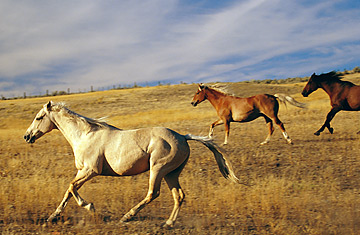
Horses gallop in field in Seneca, Oregon.
I was moved by the volume of tributes to Barbaro upon his passing: front-page articles, thousands of cards from fans, a college scholarship in his name. Then I found out Barbaro was a horse.
Here's what they do with dead horses in the rest of the world: they eat them. But in our country the thought of eating horse is so taboo that the American Horse Slaughter Prevention Act was just reintroduced in Congress--although there are even fewer horses eaten than flags burned. Despite our reputation, it turns out we are actually a nation that thinks like a 14-year-old girl.
The only thing that made me wary about eating horse is that Brigitte Bardot, perhaps the hottest woman ever, has spent her postacting career campaigning for a ban on the meat. That seemed convincing until I found out that Bardot also backs Jean-Marie Le Pen, the far-right French politician, and has bashed Muslims, gays and the presence of women in government. Plus, she hasn't aged all that well.
I decided not to let a bunch of horse freaks, regardless of how hot they once were, prevent me from eating meat enjoyed in Japan, Belgium, France, Italy, Sweden, the Netherlands, Germany and Austria. I quickly found out, however, that it's just about impossible to get a good piece of horse in the U.S. There had been three horsemeat-processing plants here that shipped meat overseas for consumption by humans and kept some behind for consumption by animals. But the two plants in Texas were ordered shut last month when a court of appeals agreed to enforce a 1949 state law banning the sale of horsemeat to be eaten by people. The one in Illinois was unwilling to ship some to me in California because my state's laws make selling horsemeat for dinner illegal, even though I promised not to reveal where I got it. This "Scooter" Libby trial is indeed having chilling effects on journalism.
So I got a friend in Vancouver to drive to the Oyama Sausage Co., a high-end meat store at the amazing market on Granville Island. Sadly, she wasn't able to pick up any horse steaks, or better yet Italian horse salami or German horse sausage. Not only are they supposed to be great, but it would have allowed me to say horse salami and horse sausage throughout this article. But she did pick up half a pound of salted, cured meat. On the FedEx form, she called the shipment a "leather art project," which seemed about right. Still, Homeland Security must have been wary of our ploy, since the package arrived with a big green sticker reading EXAMINED BY U.S. CUSTOMS AND BORDER PROTECTION but was otherwise untouched. American shores, you should know, are not safe from rogue cold cuts.
When I opened my package, I couldn't believe how deeply red the meat was. The Japanese call it sakura, which means "cherry blossom," because of the color. I kept waiting to slice it up to serve with goat cheese and crackers and an earthy bottle of Châteauneuf-du-Pape, but my wife Cassandra kept saying she wasn't hungry yet. Cassandra, I was learning, takes her clichés pretty seriously. When she was finally hungry enough to eat a horse, I cut us some thin slices.
It turned out to be pretty awesome--a sweet, rich, superlean, oddly soft meat, closer to beef than venison. I put some slices over a salad of arugula with olive oil and a splash of lemon juice and some caramelized onions. It was like a livelier, lighter braseola.
